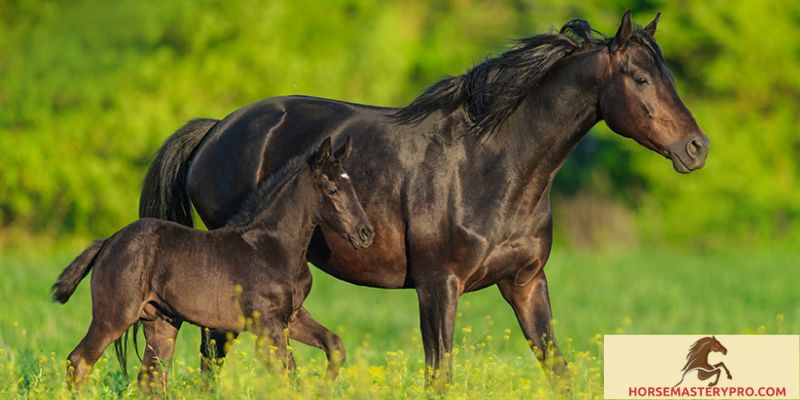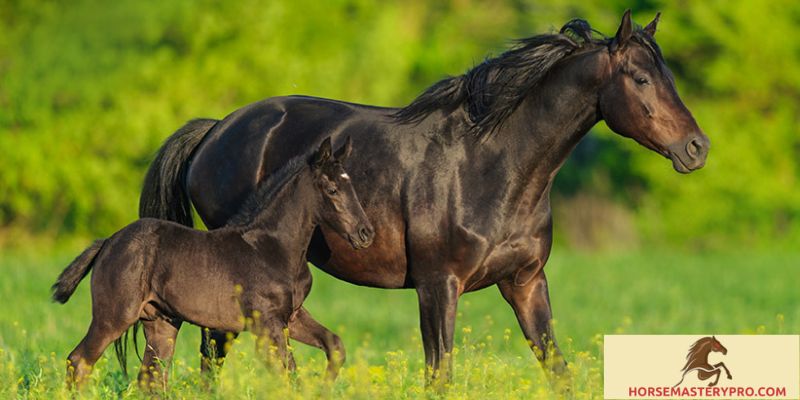Discover the educational requirements for a horse breeder job. From high school diploma to equine science degree, find the perfect path to pursue your passion.
Introduction
Are you passionate about horses and fascinated by the art of breeding? Do you dream of a career that allows you to work closely with these majestic creatures while contributing to the improvement of their bloodlines? If so, then becoming a horse breeder might be the perfect path for you!
In the world of equine enthusiasts, the horse breeding industry plays a crucial role. It involves the careful selection and pairing of horses to produce offspring with desirable traits, such as strength, agility, and temperament. This process requires the expertise and dedication of skilled professionals known as horse breeders.
Why is a Horse Breeder Job Description Important?
A well-written horse breeder job description serves as a crucial tool for both employers and aspiring breeders. For employers, it helps attract suitable candidates by clearly outlining the responsibilities, skills, and qualifications required for the role. On the other hand, for individuals aspiring to become horse breeders, a comprehensive job description provides valuable insights into the expectations and demands of the profession.
Purpose of this Article
In this comprehensive guide, I will walk you through the intricacies of a horse breeder job description, shedding light on the responsibilities, skills, qualifications, and working conditions associated with this exciting career. Whether you are considering a career change or simply intrigued by the world of horse breeding, this article will equip you with the necessary knowledge to understand what it takes to thrive as a horse breeder.
So, let’s delve into the fascinating realm of horse breeding and discover the fulfilling journey that awaits you as a horse breeder.
Responsibilities of a Horse Breeder
As a horse breeder, you will play a pivotal role in shaping the future of the equine world. Let’s explore the key responsibilities that come with this esteemed position.
Breeding and Selecting Horses for Specific Purposes

One of the primary tasks of a horse breeder is to carefully select and pair horses to produce offspring with specific traits and characteristics. This involves studying pedigrees, assessing conformation, and evaluating the performance potential of each horse. By leveraging their expertise in equine genetics and knowledge of breed standards, horse breeders aim to produce horses that excel in various disciplines, such as racing, show jumping, dressage, or pleasure riding.
Managing Horse Breeding Operations
Horse breeding is a complex process that requires meticulous planning and management. As a horse breeder, you will oversee all aspects of breeding operations, including scheduling and coordinating mating, monitoring fertility cycles, and ensuring the well-being of both mares and stallions during the breeding process. This includes arranging veterinary care, managing reproductive technologies, and maintaining breeding facilities to create an optimal environment for successful breeding.
Ensuring Proper Care and Nutrition for Horses
Horse breeders are responsible for the overall health and well-being of their horses. This involves providing proper nutrition, designing and implementing feeding plans, and ensuring access to clean water and adequate exercise. By closely monitoring the horses’ health, weight, and body condition, breeders can make informed decisions to optimize their horses’ physical development and performance potential.
Overseeing Breeding Records and Pedigrees
Accurate record-keeping is crucial in the horse breeding industry. Horse breeders are responsible for meticulously documenting breeding records, including breeding dates, parentage, foaling dates, and any relevant health information. These records not only serve as a historical account but also provide valuable information for future breeding decisions and maintaining breed integrity.
Collaborating with Veterinarians and Farriers
Collaboration with equine professionals, such as veterinarians and farriers, is an essential aspect of a horse breeder’s role. Working closely with veterinarians ensures the health and fertility of the horses, while collaborating with farriers contributes to proper hoof care and soundness. Effective communication and teamwork between the breeder and these professionals are vital for the overall well-being and success of the horses.
Monitoring and Maintaining Horse Health
A horse breeder must have a keen eye for detecting signs of illness or injury in horses. Regular health checks, vaccinations, and deworming protocols are essential to maintain optimal health. By conducting routine examinations and implementing preventive measures, breeders can minimize the risk of diseases and ensure the long-term well-being of their horses.
In the next section, we will explore the skills and qualifications necessary for a successful career as a horse breeder. So, let’s dive in!
Skills and Qualifications
As a horse breeder, possessing a diverse set of skills and qualifications is essential to excel in this field. Let’s explore the key attributes that make a successful horse breeder:
3.1 Knowledge of Horse Anatomy, Genetics, and Breeding Techniques

To make informed decisions when selecting horses for breeding, a deep understanding of horse anatomy, genetics, and breeding techniques is paramount. Familiarity with different breeds, their physical characteristics, and genetic predispositions allows breeders to make well-informed choices that align with breeding goals. Moreover, a sound knowledge of breeding techniques, such as artificial insemination or natural cover, enables breeders to maximize the chances of successful reproduction.
3.2 Experience in Horse Handling, Training, and Judging
Working closely with horses demands hands-on experience in horse handling, training, and judging. Breeders should possess the ability to handle horses confidently, gaining their trust and respect. Experience in training horses helps breeders identify desirable traits and behaviors that can be passed down to offspring. Additionally, a keen eye for evaluating conformation, movement, and temperament is crucial when assessing horses for breeding purposes.
3.3 Excellent Observational and Problem-Solving Skills
Horse breeders must possess excellent observational skills to detect subtle changes in behavior, health, or reproductive cycles. These skills enable breeders to identify potential issues early on and take necessary measures to ensure the well-being of both mares and stallions. Moreover, problem-solving skills are vital when troubleshooting breeding challenges or addressing unexpected situations that may arise during the breeding process.
3.4 Strong Organizational and Record-Keeping Abilities
Managing breeding operations involves meticulous organization and record-keeping. Breeders must maintain accurate records of breeding histories, pedigrees, healthcare, and breeding outcomes. This information facilitates informed decision-making and contributes to the overall improvement of breeding programs. Strong organizational skills ensure that breeding operations run efficiently and effectively.
3.5 Effective Communication and Teamwork Skills
Collaboration with veterinarians, farriers, and other professionals in the equine industry is crucial for a horse breeder’s success. Effective communication skills facilitate clear and concise exchange of information, ensuring that all parties involved are on the same page. Moreover, the ability to work collaboratively as a team promotes a harmonious and productive breeding environment.
3.6 Physical Stamina and Ability to Work Outdoors
Horse breeding is a physically demanding profession that requires stamina and the ability to work outdoors in various weather conditions. Breeders often find themselves working long hours, handling horses, assisting with foalings, and managing the day-to-day operations of the breeding facility. Stamina and resilience are essential to meet the physical demands of the job and ensure the well-being of the horses in their care.
By honing these skills and acquiring the necessary qualifications, you can embark on a fulfilling journey as a horse breeder. The next section will delve into the educational requirements to pursue a career in horse breeding.
Working Conditions and Salary
Work Environment: Stables, Pastures, and Breeding Facilities
As a horse breeder, your workplace will primarily be the great outdoors, surrounded by the beauty and tranquility of stables, pastures, and breeding facilities. You’ll have the privilege of spending your days immersed in the world of horses, witnessing their grace and power firsthand. From the lush green pastures where horses graze to the well-maintained stables that provide shelter, you’ll find yourself in an environment that fosters both the physical and mental well-being of these magnificent animals.
Irregular Working Hours, Including Weekends and Holidays
The life of a horse breeder is far from ordinary. The nature of the job demands flexibility and dedication, often requiring you to work irregular hours, including weekends and holidays. Horses do not adhere to a strict schedule, and as a breeder, you’ll need to be available at all times to attend to their needs. Whether it’s assisting with a foaling or managing breeding operations during peak breeding seasons, your commitment to the horses’ well-being will always take precedence over traditional working hours.
Physical Demands of the Job
Becoming a horse breeder requires physical stamina and a willingness to work in various weather conditions. You’ll find yourself engaged in a range of physical tasks, including handling, grooming, and training horses. From leading horses to and from pastures to assisting with veterinary procedures, you’ll be actively involved in the day-to-day care of these magnificent animals. It’s important to maintain your own fitness and well-being to ensure you can meet the physical demands of the job and provide the horses with the care they deserve.
Salary Range Depending on Experience and Location
The salary of a horse breeder can vary depending on factors such as experience, location, and the scale of the breeding operation. Entry-level positions may offer a modest starting salary, while experienced and successful breeders can earn a comfortable income. Additionally, the location of your breeding operation can also impact your earning potential. Areas with a high demand for horses or prestigious breeding programs often offer more lucrative opportunities. It’s important to note that while the financial rewards can be significant, the true fulfillment of being a horse breeder lies in the passion and love for these magnificent creatures.
In the next section, we’ll conclude our exploration of the horse breeder job description and recap the key aspects of this rewarding career.
Conclusion
As we wrap up our exploration of the horse breeder job description, it’s clear that this profession requires a unique combination of passion, knowledge, and dedication. Horse breeders play a vital role in shaping the future of the equine world, ensuring the production of exceptional horses with desirable traits and qualities.
From the responsibilities of selecting and breeding horses to managing operations and maintaining records, a horse breeder must possess a deep understanding of horse anatomy, genetics, and breeding techniques. Alongside these technical skills, effective communication, problem-solving abilities, and strong organizational skills are also crucial for success in this field.
If you’re considering a career as a horse breeder, there are various educational paths you can pursue. While a high school diploma or equivalent is the minimum requirement, obtaining a bachelor’s degree in equine science or a related field can provide a solid foundation of knowledge and enhance your credibility as a professional. Additionally, certification programs or apprenticeships offer valuable hands-on experience and networking opportunities within the industry.
Remember, embarking on a career as a horse breeder will require hard work, long hours, and a lifelong commitment to the well-being and improvement of horses. However, the rewards are immeasurable. You’ll have the opportunity to witness the birth of magnificent foals, contribute to the advancement of horse breeds, and be part of a community of passionate individuals who share your love for these extraordinary animals.
So, if you’re ready to embrace the challenges and joys that come with being a horse breeder, take the first step on this remarkable journey. Explore educational opportunities, gain hands-on experience, and immerse yourself in the world of horse breeding. Start your pursuit of excellence and make your mark in the equine industry.
Thank you for joining me on this informative exploration of the horse breeder job description. If you’re looking for further guidance and resources on your journey to becoming a successful horse breeder, visit Horsemasterypro.com. Let your passion for horses guide you as you carve a fulfilling career in the captivating world of horse breeding.

